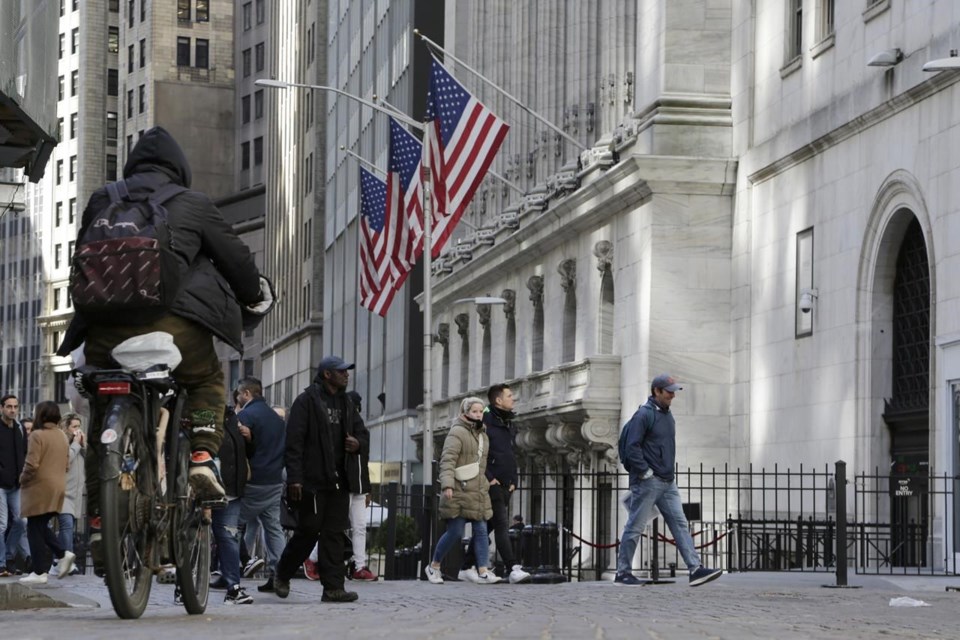NEW YORK (AP) — More losses for stocks have September on track to be the worst month of the year for Wall Street. The S&P 500 was 0.4% lower early Monday, coming off its worst week in six months. The Dow fell 85 points and the Nasdaq composite gave back 0.6%. Stocks have struggled recently as the realization sinks in that the Federal Reserve will likely keep interest rates high well into next year. The Fed wants to ensure inflation gets back down to its target, and it said last week it will likely cut rates in 2024 by less than traders expected.
THIS IS A BREAKING NEWS UPDATE. AP’s earlier story follows below.
Wall Street inched lower early Monday following last week's rout, the market's worst stretch in six months.
Futures for the S&P 500 were off 0.3% and futures for the Dow Jones industrials ticked down 0.2% before the bell.
Worries over China’s property sector, a U.S. government shutdown and the continued strike by American autoworkers were weighing on markets.
Media and entertainment companies got a small boost from news that a tentative agreement was reached Sunday to end a historic screenwriters strike after nearly five months. No deal is yet in the works for striking actors.
Shares in Warner Bros. Discovery, Paramount, Disney and Netflix all rose about 2% or less.
Amazon announced Monday that it is investing up to $4 billion in Anthropic and taking a minority stake in the artificial intelligence startup. It's the latest Big Tech company to pour money into AI as they race to capitalize on the opportunities that the latest generation of the technology is set to fuel. Amazon was up less than 1% before markets opened Monday.
On Friday, the S&P 500 slipped 0.2%, while the Dow Jones Industrial Average fell 0.3%. The Nasdaq composite dipped 0.1%. The retreat has deepened with Wall Street’s growing conviction that interest rates likely won’t come down much anytime soon.
The S&P is pointing to a fourth consecutive down week.
Yields in the bond market have climbed to their highest levels in more than a decade. They’d been rising for months and accelerated this week after the Federal Reserve indicated it’s unlikely to cut its main interest rate by as much in 2024 as investors had hoped. The federal funds rate is at its highest level since 2001, which grinds down on investment prices as it undercuts high inflation.
High rates drag down inflation by intentionally slowing the economy and denting prices for investments.
When bonds pay more in interest, investors are less willing to pay high prices for stocks, especially those seen as the most expensive or those that force investors to wait for big growth in the future.
Recently, that’s meant particular pain for big technology stocks.
Adding to unease, the U.S. federal government is heading toward a shutdown at the month’s end that would disrupt many services, squeeze workers and roil politics. It comes as Republicans in the House, fueled by hard-right demands for deep cuts, force a confrontation with Democrats over federal spending.
On top of that, American auto workers expanded their strike against major carmakers late last week, walking out of 38 General Motors and Stellantis parts-distribution centers in 20 states. In announcing the strike’s expansion Friday, United Auto Workers President Shawn Fain said Ford was spared additional strikes because the company has met some of the union’s demands during negotiations over the past week.
Auto workers want improved pay and benefits, and a prolonged strike could put upward pressure on inflation if shortages of popular models send prices higher.
Troubled property developer China Evergrande sank nearly 22% after announcing it was unable to raise further debt due to an investigation into one of its affiliates, a predicament that might imperil plans for restructuring its more than $300 billion in debt.
Hong Kong's Hang Seng lost 1.8% to 17,729.29, while the Shanghai Composite index declined 0.5% to 3,115.61.
Japan's Nikkei 225 was up 0.9% at 32,678.62.
In Seoul, the Kospi lost 0.5% to 2,495.76, while Australia's S&P/ASX 200 reversed its losses to pick up 0.1%, to 7,076.50.
In Europe at midday, Germany’s DAX, the CAC 40 in Paris and Britain’s FTSE 100 all declined about 0.7%.
In other trading Monday, U.S. benchmark crude oil lost 15 cents to $89.88 per barrel in electronic trading on the New York Mercantile Exchange. It added 40 cents on Friday.
Brent crude, the pricing basis for international trading, slipped 10 cents to $91.86 per barrel.
The U.S. dollar rose to 148.68 Japanese yen from 148.28 yen. The euro fell to $1.0632 from $1.0654.
—-
Elaine Kurtenbach And Matt Ott, The Associated Press



